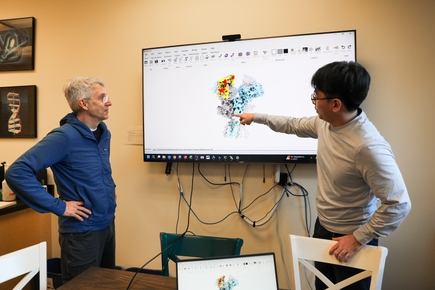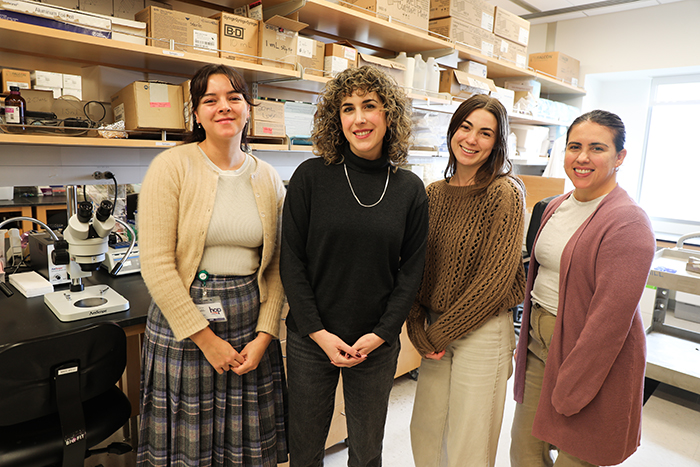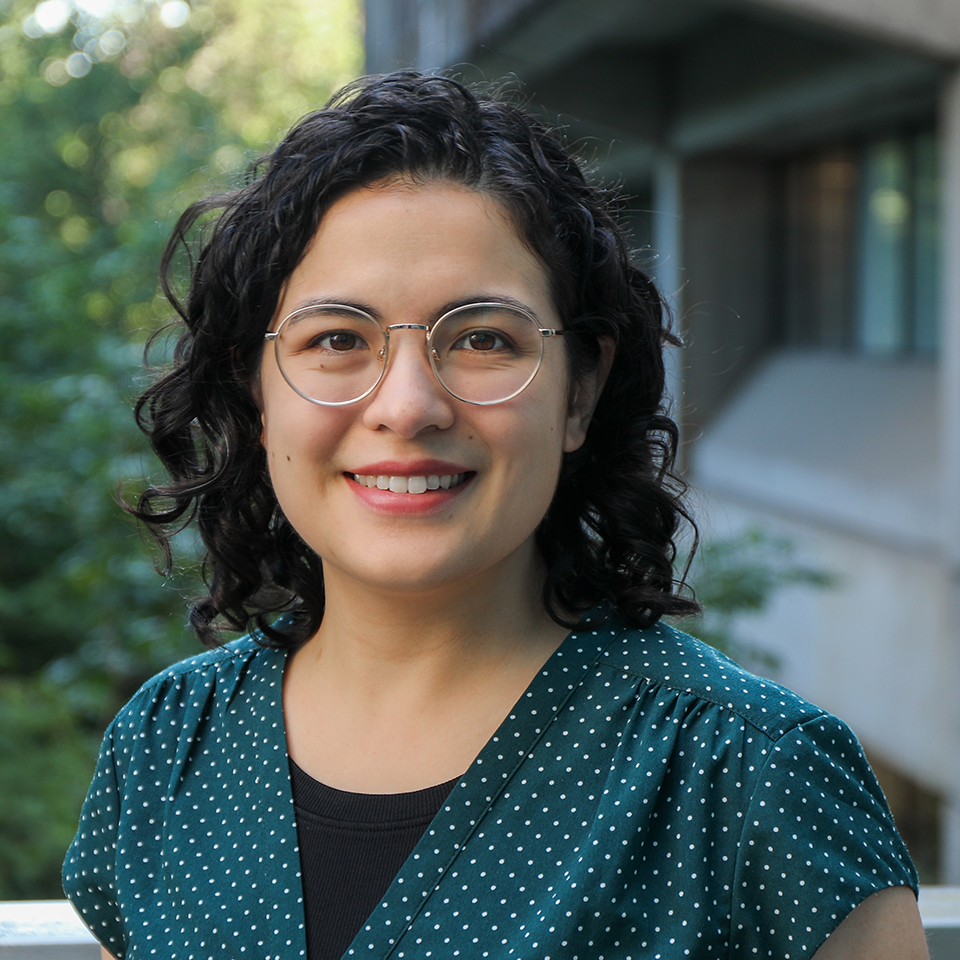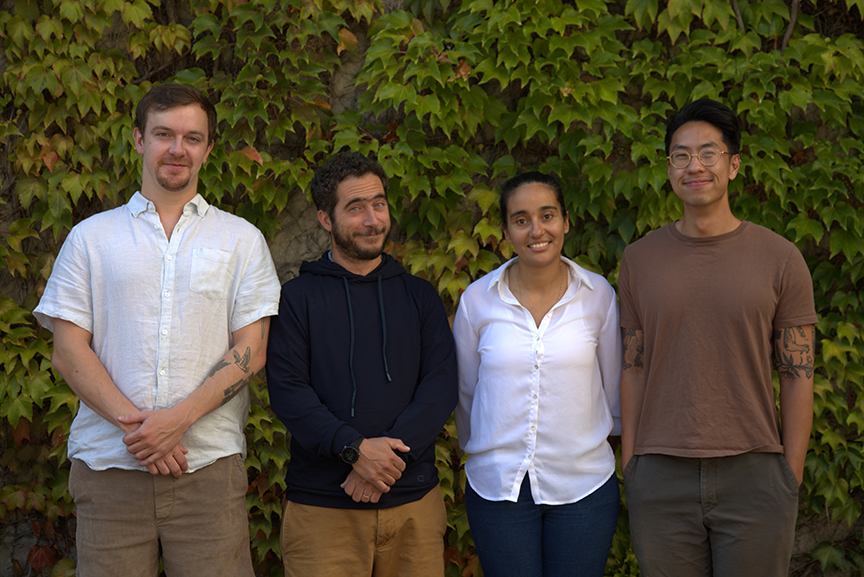Welcome!

The Vollum Institute is a privately endowed research institute at Oregon Health & Science University dedicated to basic research that will lead to new treatments for neurological and psychiatric diseases. Vollum scientists have broad-ranging interests that coalesce around molecular neurobiology and cellular physiology. Their work has transformed the field of neuroscience and, in particular, has provided important advances in the study of synaptic transmission, neuronal development, neurotransmitter transporters, ion channels and the neurobiology of disease.
Learn more about the Vollum's mission
Vollum Seminar Series
Friday Work–In–Progress Talks
The Friday "work-in-progress" (WIP) seminars occur weekly during the academic year and provide an opportunity for postdoctoral fellows and graduate students to share their current research projects in an interactive and less formal environment.
Research highlights
Renal PIEZO2 is an essential regulator of renin.
Hill RZ, Nelson JW, Gyarmati G, Medrano S, Shirvan S, McCormick JA, Burquez S, Ahmed J, Eng DG, Wysocki J, Dubin AE, Servin-Vences MR, Lakshmanan A, Gomez RA, Sequeira-Lopez MLS, Shankland SJ, Batlle D, Miner JH, Peti-Peterdi J, Patapoutian A. Cell. 2025 Dec 4:S0092-8674(25)01309-1. doi: 10.1016/j.cell.2025.11.013. Online ahead of print. PMID: 41349545.
Astrocyte gap junctions and K ir channels contribute to K+ buffering and regulate neuronal excitability.
Bojovic D, Dagostin A, Sullivan SJ, Emery B, von Gersdorff H, Mishra A. Front Cell Neurosci. 2025 Nov 20;19:1571218. doi: 10.3389/fncel.2025.1571218. eCollection 2025. PMID: 41356497.
Dimeric gold nanoparticles enable multiplexed labeling in cryoelectron tomography.
Kim H, Spangler CJ, Matsui A, Elferich J, Kim J, Roseborough A, Nyman M, Lahtinen TM, Gouaux E.Proc Natl Acad Sci U S A. 2025 Dec 2;122(48):e2524034122. doi: 10.1073/pnas.2524034122. Epub 2025 Nov 24. PMID: 41284882.
The photoswitchable cannabinoid azo-HU308 enables optical control of Ca2+ dynamics in INS-1 β-cells via off-target effects on TRPC channels.
Viray AEG, Frank JA.FEBS Open Bio. 2025 Nov 2. doi: 10.1002/2211-5463.70146. Online ahead of print. PMID: 41178137.
Targeting Tmem63b and Piezo2 in C-fiber low-threshold mechanoreceptors: Limitation of Vglut3-IRES-Cre.
Orlin DJ, Muñoz A, Berryman S, Semidey D, Murthy SE. Biophys J. 2025 Nov 1:S0006-3495(25)00733-7. doi: 10.1016/j.bpj.2025.10.043. Online ahead of print. PMID: 41176617.
Mice carrying the human dopamine D2 receptor pathogenic mutation p.Met374Arg exhibit hyperactivity and aberrant D2 receptor function.
Rodriguez-Contreras D, Lebowitz JJ, Reed C, Walker-Ziegler E, Buck DC, Li G, Xie S, Li Y, Fedorov LM, Phillips TJ, Williams JT, Neve KA. Mol Pharmacol. 2025 Nov;107(11):100080. doi: 10.1016/j.molpha.2025.100080. Epub 2025 Sep 26. PMID: 41130020.
Noise-Induced Hearing Loss Enhances Ca2+-Dependent Electrical Activity in Lateral Cochlear Efferents.
Hong 洪卉 H, Trussell LO. J Neurosci. 2025 Nov 19;45(47):e0850252025. doi: 10.1523/JNEUROSCI.0850-25.2025. PMID: 41038646.
Transcriptomic diversity of amygdalar subdivisions across humans and nonhuman primates.
Totty MS, Cervera Juanes R, Bach SV, Ben Ameur L, Valentine MR, Simons E, Romac MD, Trinh H, Henderson K, Del Rosario I, Tippani M, Miller RA, Kleinman JE, Page SC, Saunders A, Hyde TM, Martinowich K, Hicks SC, Costa VD. Sci Adv. 2025 Sep 19;11(38):eadw1029. doi: 10.1126/sciadv.adw1029. Epub 2025 Sep 17. PMID: 40961182.
Altered Primary Somatosensory Neuron Development in a Pten Heterozygous Model for Autism Spectrum Disorder.
Fernandez A, Sarn N, Eng C, Wright KM. Autism Res. 2025 Sep 12. doi: 10.1002/aur.70119. Online ahead of print. PMID: 40940651.
Human brain cell types shape host-rabies virus transcriptional interactions revealing a preexisting pro-viral astrocyte subpopulation.
Feige L, Young K, Cerapio JP, Kozaki T, Kergoat L, Libri V, Ginhoux F, Hasan M, Ben Ameur L, Chin G, Goode Z, Bourhy H, Saunders A. Cell Rep. 2025 Aug 25;44(9):116159. doi: 10.1016/j.celrep.2025.116159. Online ahead of print. PMID: 40864551.
FBXW7 regulates MYRF levels to control myelin capacity and homeostasis in the adult central nervous system.
Collins HY, Doan RA, Li J, Early JE, Madden ME, Simkins T, Lyons DA, Monk KR, Emery B. Nat Commun. 2025 Aug 21;16(1):7822. doi: 10.1038/s41467-025-62715-9. PMID: 40841354.
The bile acid-sensitive ion channel is gated by Ca2+-dependent conformational changes in the transmembrane domain.
Freitas MM, Gouaux E. Nat Commun. 2025 Jul 22;16(1):6746. doi: 10.1038/s41467-025-62038-9. PMID: 40695804.
TMEM63A, associated with hypomyelinating leukodystrophies, is an evolutionarily conserved regulator of myelination.
Halford J, Senatore AJ, Berryman S, Muñoz A, Semidey D, Doan RA, Coombs AM, Noimany B, Emberley K, Emery B, Monk KR, Murthy SE. Proc Natl Acad Sci U S A. 2025 Jul 29;122(30):e2507354122. doi: 10.1073/pnas.2507354122. Epub 2025 Jul 21. PMID: 40694323.
A high-performance genetically encoded sensor for cellular imaging of PKC activity in vivo.
Yahiro T, Bayless-Edwards L, Jones JA, Zhuo Y, Ma L, Qin M, Mao T, Zhong H. Nat Commun. 2025 Jul 10;16(1):6378. doi: 10.1038/s41467-025-61729-7. PMID: 40640216.
Real-Time Optical Control of CB1 Receptor Signaling In Vitro with Tethered Photoswitchable (-)-trans-Δ9-Tetrahydrocannabinol Derivatives.
Garza SJ, Kicin B, Sarott RC, Pfaff P, Kosar M, Weishaar T, Schnacke P, Lobingier BT, Carreira EM, Frank JA.J Am Chem Soc. 2025 Jul 9;147(27):23482-23491. doi: 10.1021/jacs.4c18379. Epub 2025 Jun 30. PMID: 40586440.
Gating and noelin clustering of native Ca2+-permeable AMPA receptors.
Fang C, Spangler CJ, Park J, Sheldon N, Trussell LO, Gouaux E. Nature. 2025 Jun 23. doi: 10.1038/s41586-025-09289-0. Online ahead of print. PMID: 40550474.
GPCR signaling gates astrocyte responsiveness to neurotransmitters and control of neuronal activity.
Guttenplan KA, Maxwell I, Santos E, Borchardt LA, Manzo E, Abalde-Atristain L, Kim RD, Freeman MR. Science. 2025 May 15;388(6748):763-768. doi: 10.1126/science.adq5729. Epub 2025 May 15. PMID: 40373148.
Structural basis of lipid transfer by a bridge-like lipid-transfer protein.
Kang Y, Lehmann KS, Long H, Jefferson A, Purice M, Freeman M, Clark S. Nature. 2025 Jun;642(8066):242-249. doi: 10.1038/s41586-025-08918-y. Epub 2025 Apr 23. PMID: 40269155.
Mechanism of small heat shock protein client sequestration and induced polydispersity.
Miller AP, Reichow SL. Nat Commun. 2025 Apr 16;16(1):3635. doi: 10.1038/s41467-025-58964-3. PMID: 40240363.
Dock1 functions in Schwann cells to regulate development, maintenance, and repair.
Doan RA, Monk KR. J Cell Biol. 2025 May 5;224(5):e202311041. doi: 10.1083/jcb.202311041. Epub 2025 Mar 19. PMID: 40105697.
Morphological and functional decline of the SNc in a model of progressive parkinsonism.
Muñoz JM, Williams JT, Lebowitz JJ. NPJ Parkinsons Dis. 2025 Jan 29;11(1):24. doi: 10.1038/s41531-025-00873-9. PMID: 39875379.
Scientists identify target to treat devastating brain disease

Scientists have identified a promising target for treatment of a devastating autoimmune disease affecting the brain.
The discovery could lead to the development of new therapies for a disease triggered by an attack on one of the key neurotransmitter receptors in the brain, the NMDA receptor. It also raises the potential for a blood test to detect a signal of the condition and enable earlier treatment with existing therapies.
The study from Oregon Health & Science University published today in the journal Science Advances.
Researchers identify kidney sensor that helps control fluid balance

A new study has identified a critical “pressure sensor” inside the kidney that helps the body control blood pressure and fluid levels. The finding helps explain how the kidneys sense changes in blood volume — something scientists for decades have known occurs but didn’t have a mechanistic explanation.
Marissa Co named Simons Foundation Fellow

Marissa Co, Ph.D., a postdoctoral scholar in the Wright & O’Roak labs in the OHSU School of Medicine, has received a Simons Foundation fellowship. She is one of nine recipients in the 2025 Fellows-to-Faculty class, supported by the Simons Foundation Autism Research Initiative (SFARI).
Two graduate students named 2025 Lacroute Fellows

Two predoctoral students in the Neuroscience Graduate Program at OHSU were recently awarded the 2025 Lacroute Fellowship. This fellowship is made possible through the philanthropic support of a generous donor.
The Lacroute Fellows Program supports exceptional graduate students conducting innovative research in the Vollum Institute/OHSU Neuroscience Graduate Program. The one-year fellowships cover $24,000 of the students’ stipend and provide a $1,000 allowance for related academic expenses, such as attending scientific conferences or courses.
Congratulations to the 2025 fellows:
- Hoa Trinh, Freeman Lab
- Jed Syrenne, Murthy Lab and Reichow Lab
Saunders lab's Cell Reports article describes the unique role of astrocyte innate immune signaling in combating viral infection

Arpy Saunders, Ph.D., assistant scientist at the OHSU Vollum Institute, and colleagues have discovered that the rabies virus interacts with human brain cell types in unexpected ways. Using single-cell molecular analysis, they found that rabies normally stays “stealthy” by blocking the brain’s innate immune defenses. When this ability was removed, infection spiked in a rare group of astrocytes — support cells that play vital roles in brain function. The findings reveal how the brain balances protection and vulnerability during viral attack and highlight astrocytes as key players in future efforts to understand and treat brain infections. Their findings were just published in Cell Reports.
Tony Muñoz Awarded 2025 Gilliam Fellowship for neuroscience excellence

Tony Muñoz, a graduate student and Ph.D. candidate in Oregon Health & Science University’s Neuroscience Graduate Program, has been awarded the Howard Hughes Medical Institute’s 2025 Gilliam Fellows Program grant. He is also an active member of the Society for the Advancement of Chicanos/Hispanics and Native Americans in STEM at OHSU, which aims to promote inclusivity and community within the institution.
Muñoz conducts research in the lab of Swetha Murthy, Ph.D., an assistant scientist in the Vollum Institute who specializes in mechanotransduction and ion channels. He is one of 30 graduate students and their advisers nationwide selected for the 2025 cohort of the Gilliam Fellows Program.
More news and accolades
- Vollum neuroscientist achieves rare distinction, earns $5.4 million award
- Researchers identify gene implicated in disorders affecting millions
- OHSU student, from Jackman lab, takes top prize in Invent Oregon competition
- OHSU researchers discover link between key protein and brain synapse development
- Sci Pol PDX hosts conversation with elected officials
Recognition for our early career awardees
Graduate students and postdoctoral fellows are usually supported by research grants to individual faculty or by institutional training grants from the NIH. However, a sought-after perk for trainees is to obtain an individual fellowship from federal sources or foundations. Such awards are an honor and also provide important financial support for the trainee and their lab. Graduate students and postdoctoral fellows in the Vollum Institute have been remarkably successful in obtaining these awards over the past few years. This is a credit to the quality of the trainees and the support they receive from their mentors. Congratulations to all.
Two predoctoral students in the Neuroscience Graduate Program at OHSU were recently awarded the 2025 Lacroute Fellowship. This fellowship is made possible through the philanthropic support of a generous donor.
The Lacroute Fellows Program supports exceptional graduate students conducting innovative research in the Vollum Institute/OHSU Neuroscience Graduate Program. The one-year fellowships cover $24,000 of the students’ stipend and provide a $1,000 allowance for related academic expenses, such as attending scientific conferences or courses.
Congratulations to the 2025 fellows:
- Hoa Trinh, Freeman Lab
- Jed Syrenne, Murthy Lab and Reichow Lab
2024 Lacroute Fellows
2023 Lacroute Fellows
2022 Lacroute Fellows
- Cody Call, Ph.D., Monk Lab
NINDS K99: “A novel role for cell cycle regulators in oligodendrogenesis and myelination.” - Marissa Co, Ph.D., Wright lab
Simons Foundation Fellow - Nathaniel Ghena, Ph.D., Freeman Lab
NINDS F32: “Exploring role of astrocytic adhesion GPCR Remoulade in neuronal remodeling.” - Dongeun Heo, Ph.D., Monk/Freeman Labs
NINDS F32: "Investigating the role of diazepam binding inhibitor (DBI) in astrocytes and neural circuit maturation." - James Jones, Ph.D., Mao Lab
NIMH F32: "Intracellular signaling dynamic control of synaptic responses in the basal ganglia." - Cathy Spangler, Ph.D., Gouaux Lab
NIH Natl Cancer Inst: “Structural and functional characterization of native AMPA receptor complexes in glioblastoma.” - Colin Wakeham, Ph.D., von Gersdorff Lab
NINDS F32: "Intracellular signaling dynamic control of synaptic responses in the basal ganglia."
- Landon Bayless-Edwards, Mao Lab
NIDA NRSA F30: "Intracellular signaling mechanisms underlying opioid modulation of pain." - Madison Hupp, Freeman Lab
NINDS F31: "Neuronal and glial mechanisms regulating Pair1 local pruning." - Arielle Isakharov, Wright Lab
NEI F31 Predoctoral Fellowship: "Genetic analysis of the Robo3+ glycinergic amacrine cell." - Chloé Le Moing, Jackman Lab
NINDS F31: "Examining the role of synaptic facilitation in cortical network function and behavioral flexibility." - Chloé Le Moing, Jackman Lab
2025 Invent Oregon Collegiate Challenge winner - Tony Muñoz, Murthy Lab
HHMI Gilliam Fellow: "Investigating Mechanosensors Involved in Swallowing Physiology." - Melanie Piller, Monk Lab
NINDS F31: "The role of P/Q-type channels in oligodendrocyte lineage cell development." - Yessica Santana Agreda, Wright Lab
HHMI Gilliam Fellow: "Transcriptional Control of Starburst Amacrine Cell Specification and Maturation." - Erin Santos, Freeman Lab
HHMI Gilliam Fellow: "CamKII-Dependent Mechanisms of Astrocyte Ca2+ Signaling." - Frederika Sullivan, Wright Lab
National Science Foundation, Graduate Research Fellowship - Jed Syrenne, Murthy Lab and Reichow Lab
2025 Lacroute Fellow - Hoa Trinh, Freeman Lab
2025 Lacroute Fellow
Congratulations to all of our graduate researchers in the Vollum/OHSU Neuroscience Graduate Program who received ARCS Foundation Scholar Awards from the ARCS Oregon Chapter!
First Year (2025–2028): Sandra Christina Salas
Second Year (2024-2027): Juliana Cuartas & Alexa Gonzalez
Third Year (2023-2026): Kayla Maanum, Melissa (Arisa) Sek & Frederika Sullivan
ARCS Foundation Oregon is honored to present awards to these outstanding scholars chosen by the scholar selection committees at Oregon Health & Science University, Oregon State University and the University of Oregon. The ARCS Foundation Scholar Award is $18,000, payable over three years at $6,000 per year.
Learn more about these scholars and the ARCS Foundation Oregon
Congratulations to the Neuroscience Graduate Program researchers who received 2025-2026 N.L. Tartar Trust Fellowships.:
James Jones (Mao Lab)
Milana Krush (Westbrook Lab)
Nina Luong (Wright Lab)
Joselinne Medrano (Williams Lab)
Yizhou Zhuo (Gouaux Lab)
The $2,000 grants are awarded annually by the OHSU School of Medicine as a means to support research endeavors and career development. Keep up the great work!